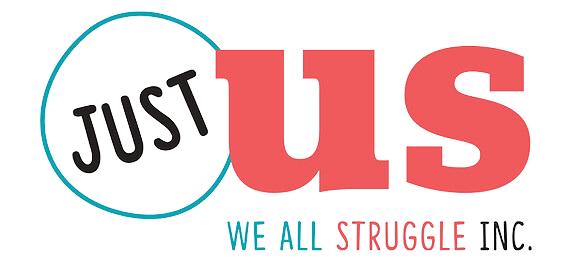How on-site therapy is supporting harm reduction staff
At Just Us, we believe mental health care should meet people where they are—literally and emotionally. That’s why our community partnerships are such an important part of our work. By bringing our services to community organizations where potential clients are already going, we can remove barriers to accessing mental health support.
Earlier this year, we started a new partnership with Avenue B Harm Reduction, bringing on-site counselling directly to those who are often overlooked in conversations about burnout, trauma and self-care: harm reduction workers.
A space to feel seen
Since January, counselling intern Tenere Wilfryd has been running bi-weekly group counselling sessions at Avenue B for staff members who choose to participate. The sessions are voluntary, small and intentionally designed to be a place where client-facing workers can decompress, reflect and reconnect with themselves.
“A lot of what we do is just creating space,” Tenere explains. “So much of harm reduction work is about being fully present for someone else, and I wanted to make a space where workers could turn that attention inward—talk about their boundaries, their grief and their relationships, without needing to perform or fix anything.”
For the team at Avenue B, the counselling support has become something to look forward to.
“We’ve had counsellors come in before, and they never really fit,” says Adrian Goguen, Avenue B’s Front End Manager. “But with Tenere, the sessions are incredible. His personality and experience in the field resonate. We’ve talked about grief, personal relationships, even philosophy—things that aren’t always easy to bring up at work. But with him, it feels natural.”
Adrian is no stranger to the emotional impact of this work. With lived experience in the harm reduction community, he understands the cost of carrying others’ pain.
“I’m good at leaving work at work, but the weight still comes home with me,” he admits. “You see things—trauma, loss—that change you. Therapy gives us a chance to process that together, and that makes a difference.”
The mental health of harm reduction workers
At Avenue B, the work starts early and doesn’t stop. Clients arrive when the doors open at 9am, seeking everything from safe supplies to someone who will listen. Staff prep sandwiches, clean up discarded needles in the community and run drug testing services—sometimes all in the same day. And all of it is done in the context of rising need and shrinking resources.
“We see about 60 to 80 people a day, and those numbers are climbing,” says Laura MacNeill, Executive Director of Avenue B. “People are coming in from rural areas, from the street, looking for support. It’s emotionally complex work, and it’s not light. Some of our staff are dealing with clients who have psychosis or complex PTSD. We have to think about staff wellness if we want them to keep showing up.”
That’s why Laura prioritized counselling as part of the organization’s staff care strategy—but deliberately chose not to attend the sessions herself.
“I want the staff to feel like they can speak openly,” she explains. “This is for them—to give them something that’s just for their wellbeing, no strings attached.”
And it’s working. From the cleaning crew to security staff, everyone at Avenue B is welcome to participate in counselling. What might seem like a small offering—a one-hour group session every other week—is actually a radical act of support in a sector that often overlooks the mental health of its caregivers.
“Most harm reduction organizations offer some kind of counselling, but usually in a reactive way—after a crisis or loss,” Tenere explains. “What we’re doing here is different. It’s proactive. We’re making space to talk about what it means to survive this work, and how to do it in a way that feels sustainable.”
Partnership in action
This program is a model for how community-based partnerships can bring meaningful, accessible mental health care to the people who need it most.
By embedding counselling directly into the workplace, Just Us removes barriers like transportation, scheduling and stigma—factors that often prevent helping professionals from getting help themselves.
And because Tenere comes from the harm reduction world, the trust was already there.
“He gets it,” Adrian says simply. “He’s seen what we’ve seen. And when someone like that sits across from you, you don’t have to explain everything. You can just talk.”
Looking ahead
The collaboration between Just Us and Avenue B is part of a bigger vision: to make mental health support more accessible for everyone—especially those doing some of the most emotionally intense work in our communities.
“Harm reduction work is often chaotic,” says Tenere. “But within that chaos, there can be moments of connection, healing and care. That’s what we’re trying to build on.”
If your community organization is interested in partnering with Just Us to bring mental health support to your team, reach out. Together, we can make sure no one gets left behind in the work of caring for others.

